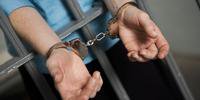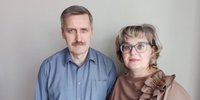The Case of Okhapkin in Kineshma
Filter
- #
R. A. Drozdov, senior investigator of the investigation department of the FSB of Russia in the Ivanovo region, initiates a criminal case on suspicion of resuming extremist activity (part 1 of article 282.2 of the Criminal Code of the Russian Federation) in the city of Kineshma.
- #
Six families of Jehovah's Witnesses are being searched in Kineshma. Some of them last until midnight. Law enforcement officers arrest Andrey Okhapkin and place him in a temporary detention facility.
- #
Investigator Drozdov prosecutes Okhapkin as a defendant under Part 1 of Article 282.2 of the Criminal Code of the Russian Federation because of a conversation about the Bible.
- #
The Oktyabrsky District Court of Ivanovo, composed of the presiding judge L. N. Zubova, with the participation of senior assistant prosecutor N. S. Seregina and investigator Drozdov, chooses a measure of restraint for Okhapkin in the form of detention in a pre-trial detention center for a period of 1 month and 26 days, that is, until January 18, 2022.
- #
The lawyer visits Okhapkin in the pre-trial detention center. The defendant's state of health is good, he has all the necessary medicines for rehabilitation after covid. The believer is kept in a cell alone, he has a Bible from the library of the pre-trial detention center, he receives many letters from fellow believers from different countries.
- #
The court softens the measure of restraint for Andrei Okhapkin and sends him under house arrest. He spent about three months in jail.
- #
The measure of restraint for Andrei Okhapkin is changed to a ban on certain actions.
- #
The case is submitted to the Kineshma City Court of the Ivanovo Region. It will be considered by judge Yevgeny Krotov.
- #
The question of the measure of restraint for the defendant is being considered. Judge Krotov replaces Okhapkin's ban on certain actions with a written undertaking not to leave the place and proper behavior.
- #
During interrogation, one witness has the right not to testify against himself or herself or his relatives. However, he informs the court that there was a search in his apartment, during which the witnesses "rummaged through things, handed over what they found to the investigator, and not just watched."
Another witness claims that he never heard extremist statements or appeals from Okhapkin.
The defendant gives consent to the court to familiarize himself with transcripts and audio recordings in open hearings.
- #
The questioning of prosecution witnesses is ongoing. One of them characterizes the defendant as a positive, kind and always ready to help person.
Another witness is offered by the judge to use Article 51 of the Constitution of the Russian Federation, since she is a close relative of the defendant. However, she decides to testify and positively characterizes Okhapkin. "Accusing him of extremism is a big mistake, even a crime against the person," the witness said.
- #
Another close relative of the defendant is being interrogated. She also decides to testify. The court asks her to tell the details of the search that took place at her home. She informs the court that the event was led by Major Roman Drozdov. According to the witness, at first the security forces tried to open the door with their own key. But after unsuccessful attempts, they rang the doorbell, introducing themselves as Okhapkin's colleagues. "They flew in, Andrei fell, 8 people, two with machine guns," she says. She characterizes the defendant as a reliable head of the family. Students speak of him respectfully, consider him an excellent teacher.
The second witness is Tagarlanov, a law enforcement officer who participated in the search of Okhapkin's apartment. He claims that he was a casually invited witness and has no relationship with other members of the task force. He does not remember the details, it is difficult to answer many questions exactly. The prosecutor reminds him that during the interrogation of the investigator, he gave detailed answers to the same questions.
- #
During the interrogation, one of the prosecution witnesses explains to the court that she has poor eyesight, and therefore she signed the interrogation protocol twice without reading. She informs the court that she did not give or write the information entered in the interrogation record with her own hand. The lawyer asks to appoint a handwriting examination to confirm this. The judge refuses, and declares that the differences in handwriting and ink color are obvious without it.
Although falsifications were found in the document, the judge postpones the issue of excluding this evidence from the case.
The second witness reports that she does not know Okhapkin, she considers Jehovah's Witnesses to be good people: "They don't smoke, they don't litter, they will always help."
- #
Interrogation of the secret witness "Titov", who claims that Andrei Okhapkin led "the organization of Jehovah's Witnesses in the city of Kineshma." When the prosecutor asks for clarification of the name of the organization, he calls "the Administrative Center of Jehovah's Witnesses in Russia." At the same time, witness Titov cannot explain why he decided that he was present at the meetings of the Administrative Center of Jehovah's Witnesses, which was located in the Leningrad Region before its liquidation.
Answering the lawyer's questions about what happened at such meetings, the witness tells the court that the believers studied the Bible, prayed and sang songs. The witness confirms that Okhapkin has never heard negative statements against other religions, as well as calls for the overthrow of the constitutional order or for the humiliation of human dignity: "He has never made any threats against anyone." Nevertheless, the secret witness refuses to declassify.
- #
The written materials of the case from 1-3 volumes are examined. Some of the hearings are held behind closed doors.
- #
The study of the written materials of the case continues.
- #
17 people come to the courtroom to support Andrey Okhapkin.
The lawyer requests that a video interview with expert Belova be included in the case in order to show her biased attitude towards Jehovah's Witnesses. The video is reviewed and attached to the case.
The defense also petitions for listening to audio recordings of worship services dated 02/18/2021 and 02/23/2021, since there are discrepancies with the transcripts of these recordings, and the examination attributed to the defendant phrases that he did not say. The judge grants the request.
- #
The court listens to audio recordings of worship services, which the state prosecution considers to be meetings of a liquidated legal entity. Andrey Okhapkin points out that there is no mention of legal entities of Jehovah's Witnesses on them. He says: "There are also no statements justifying and/or affirming the need for genocide, mass repressions, deportations, or other illegal actions, including the use of violence, against representatives of any nation, race, social group, adherents of a particular religion." The defendant explains that at the worship service, believers discussed biblical teachings, including the idea that God does not tolerate any form of violence.
- #
The defense shall file a motion to listen to the recording of the worship service in its entirety. Andrey Okhapkin explains the reason for such a request: "The transcript records only what was said, but it does not reflect how it was said: in a kind or with malice, with sympathy or with gloating. That is, the transcript does not capture my mood, feelings, emotions and tone of voice. Even pauses, tempo, and volume are important here. You have to hear it all." The judge accepts the motion.
- #
While listening to one of the audio recordings, Okhapkin explains why the discussion of the Bible cannot be counted among the activities of the local religious organization of Jehovah's Witnesses. He points out that the meeting began with a prayer, not with the election of a secretary to keep the minutes, and ended with a prayer, not a resolution or a vote. He concludes: "Jehovah's Witnesses conduct such studies with people interested in the Bible all over the world."
- #
The judge refuses to satisfy the petition to summon experts to the court, as well as to include Orthodox literature and materials with the name of God, Jehovah, in world literature.
- #
The court attaches to the case file a letter of thanks to Okhapkin from the administration of the city of Kineshma, characteristics from neighbors and from the place of work, as well as diplomas of advanced training.
- #
Recordings of telephone conversations of the defendant are heard. Andrey Okhapkin draws attention to the fact that in these conversations there is no motive of hatred and enmity, but only a desire to share valuable information from the Bible.
The court reviews the videos and reads out fragments of electronic publications that are in the case file.
- #
During the debate, prosecutor Olga Borkova requested a sentence of imprisonment for a term of 7 years in a penal colony for Andrey Okhapkin. The prosecutor also asks the court to change Okhapkin's preventive measure from recognizance not to leave to detention and arrest him in the courtroom.
- #
Andrey Okhapkin makes his last speech.
The final statement of the defendant Andrey Okhapkin in Kineshma

